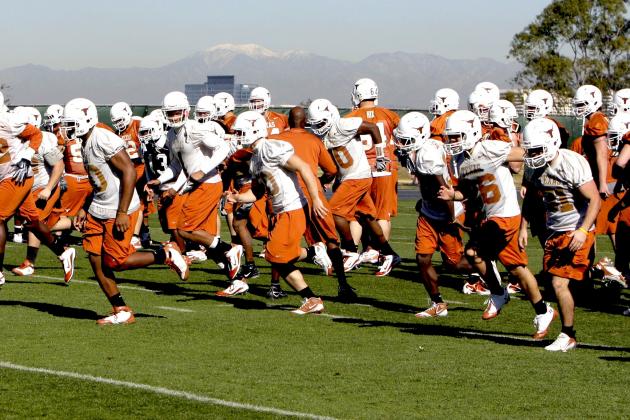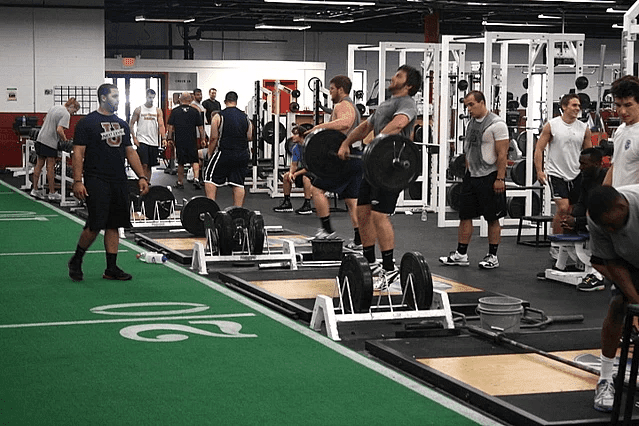How To Build A Culture of Athlete Accountability
Coach Development | MindsetABOUT THE AUTHOR

Dr. Chris Holder
Chris Holder comes to the TrainHeroic Blog with over thirty years as an athlete and coach. Chris is the Head Strength and Conditioning Coach at Cal Poly San Luis Obispo in California. A football player first and then spending his entire professional coaching career at the college level, Holder has been in love with everything weight lifting since he was a little boy.
A championship team has hundreds of moving parts that must come together for your team to make a run for the whole thing, and creating a culture of athlete accountability is a big part of that.
Perhaps the largest deciding factor in a healthy thriving team is the individual athlete’s accountability to one another.
Before we dive into how I recommend you build a culture of athlete accountability let’s first discuss the current state of American culture and how that has impacted youth athletes.
// WE DID IT TO OURSELVES
Let’s face it, the day and age of athletes clawing to get better and do the right things by their team, coaches and teammates are over.
Our society has allowed to too many psychiatrists and behaviorists, who have never been involved in athletics, dictate how to mold our kids.
We’ve coddled them to the point where they are completely unequipped to deal with any level of disappointment and any smudge of being uncomfortable.
The fear of rejection, of letting our kids experience a letdown and the need to make everyone feel special has bred a culture of young adults who don’t know how to deal with adversity.
Because I work with college aged athletes in a university setting, I get a fresh crop of 17-18 year olds every fall.
And every fall I get to see how the culture continues to devolve into entitled, weak, uninspired
group of sissies
// ATHLETE ACCOUNTABILITY STARTS AT THE TOP
I know this article has already taken a bit of a negative tone, and that is not my intention. In reality, it’s not the kids fault. We adults are to blame for their lack of motivation and sense of accountability to someone else. The society we live in has created a structure where if we don’t receive instant gratification on whatever it is that we are doing, our kids are disinterested. Their lack of effort is tangible because they have never lived in a world where the payoff is down the road.
So, where does one start to infuse team wide accountability?
It begins with the coaches.
The coaches of the team have to be one heartbeat. There can be no level of distention within the upper ranks whatsoever.
The athletes need to have a consistent message from everyone at the top. I worked many years ago at a place where our defensive coordinator would talk down about our head coach to his athletes behind closed doors.
The result? It tore the team apart. We were a very talented group who allowed one of our leaders become the cancer.
Therefore, the coaches have to send one consistent message to the athletes.
// THE ROLE OF SUPPORT STAFF
In the collegiate setting, we support staffers are as much a part of a team as the coaches of the sport itself.
Take for the strength coach for example – a strength coach will have more face time with any one athlete than that same athlete will have with his position coach over the calendar year. The strength coach has as big of an influence as the position coach simply because he is exposed to the strength coach more.
Therefore, the head coach of any team needs to make sure that his support staff is in line. This goes for strength, sports medicine and academics.
If there is a naysayer in the bunch, that person needs to either be corrected or terminated. Period.
// BE CRYSTAL CLEAR WITH YOUR EXPECTATIONS

Remember, and this is the truth, the freshman athletes coming into your program only understand the “everyone gets a trophy and a pat on the back no matter the outcome” culture. Their entire worldview is likely vastly different than what you expect of them.
Therefore, we must handle them as if they are completely ignorant to the way we want things ran.
I am very clear with my athletes what will be acceptable and what will not be when it comes to how we conduct business.
There is no gray area. It’s black and white. If you do this, that will result, no questions asked. One of the biggest poisons to any team is inconsistency in the message.
// THERE HAS TO BE CONSEQUENCES FOR LACK OF ACCOUNTABILITY
If accountability is what helps a team achieve it’s goal, then consequences for lack of accountability is where your season is won or lost. Every action has a corresponding consequence. Good or bad, the athletes need to know the entire menu of consequences for their actions.
If you are in academic trouble, then this happens.
If you come late to weights, that happens.
Very much like the sport they play where fouls and penalties are a part of the deal, they need to conduct their lives where they understand that every decision they make also has a consequence, either positive or negative.
If you come in and crush your lift, you are likely going to receive some love.

If you are late to one of my runs, the entire team will pay for your tardiness. Most athletes don’t want to be in any kind of trouble with those in authority, so if you are clear and quick with handing out punishments, the likelihood that act is repeated is considerably less.
What I’ve found is the most effective way to instill accountability to an individual is if we declare open season on the whole team. Therefore, any rule broken by one of my athletes is payed for by everyone either on their side of the ball (offense or defense) or by everyone.
Peer pressure is a bitch and most of these guys are willing to do whatever it takes to win, but don’t want to do anymore for a person who can’t follow the rules. I’ve seen entire teams turn on one individual because of a punishment. That person usually gets his act together in a hurry.

Here’s a story from back in the day for you. I played ball in a time when coaches would order “code red” on some of the players and the upperclassmen would carry out the punishment. I remember being part of a group basically breaking into a freshman’s dorm room to “encourage him” to stop missing class.
I fondly recall going to the work of one my new winter walk-on teammates who missed weights… the understanding was if he didn’t come back, we wouldn’t have to run for him so we went to his work and let him know that we would tell the coaches he quit and to never show his face again. He didn’t.
But, those days are long gone. Hazing and the athlete’s taking matters into their own hands is no longer acceptable. But what remains is not getting on the bad side of your teammates. Of all the people they don’t want to disappoint, it’s their friends.
// BUILDING A “NEXT MAN UP” CULTURE
What every athlete needs to know is that they aren’t special.
Even our superstars need to know that they are replaceable. We make no bones about it here at Cal Poly. There is another man waiting to take your spot. That is why we recruit like we do. I have 3 other guys just like you. We had a few kids get in trouble several years ago and were dismissed from the team right before the season started. How did we respond? The next guy stepped up and we didn’t miss a beat.
My third year of coaching we had a star defensive linemen intentionally skip a team event. What was the consequence? The head coach brought him into his office and gave him two choices: either transfer or he sits the next season. This young man chose to stay and the coach followed up on his consequence. He was forced to redshirt the next year. Harsh, but I tell you what… the entire team gasped when they realized that this was happening and they were all angels for years to come. On a side note, that young man became the most feared defensive player in the country, was drafted and played in the NFL for nearly 10 years.
BE THE LEADER YOUR ATHLETES NEED
What it boils down to is this: everyone needs to be on the same page. Rules and expectations need to be crystal clear from day one. The leadership in every situation needs to be on the same page and be willing to make corrections the moment it’s needed.
Your athletes want to be disciplined. They all, to some degree, want to work hard. Most of them simply don’t know how to.
It is our responsibility as their coaches to give them the tools to be successful.
We need to show them how to be accountable and then hold them to it.
It’s your job to be the role model and leader they need.
Are you a better coach after reading this?
More coaches and athletes than ever are reading the TrainHeroic blog, and it’s our mission to support them with usefull training & coaching content. If you found this article useful, please take a moment to share it on social media, engage with the author, and link to this article on your own blog or any forums you post on.
Be Your Best,
TrainHeroic Content Team
HEROIC SOCIAL
HEROIC SOCIAL
TRAINING LAB
Access the latest articles, reviews, and case studies from the top strength and conditioning minds in the TH Training Lab

